Devotion
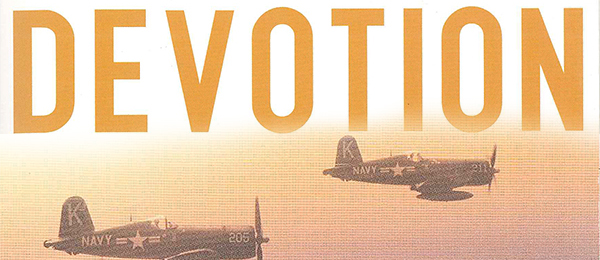
A one-on-one interview with the author of the book Devotion. Online exclusive review of Devotion.
Pilot Jesse Brown’s final flight took place above the frozen Chosin Reservoir in North Korea, during the coldest winter in nearly 100 years. He and his fellow aviators were on a mission to protect cornered Marines from the White Jackets, Communist troops that hid by day and attacked by night. The Marines’ survival depended on air power. The enemy’s weapons fired a volley into the night sky. Jesse’s Corsair developed an oil leak. Fellow pilot Tom Hudner surveyed the terrain. Jesse was going down. If he survived the crash, the enemy was sure to capture him. The torture inflicted on captured pilots was unspeakable. Tom had to decide whether to leave his friend and fellow aviator to die alone thousands of miles from home, or risk everything to save him. Jesse’s story couldn’t end there ...Devotion is Adam Makos’ story of Tom Hudner, a white pilot from the country clubs of New England, and Jesse Brown, the son of a Mississippi sharecropper who became the nation’s first black carrier pilot. Set against the backdrop of the “forgotten” Korean War and dealing with racism, the story follows the two Navy pilots through training, to duty in the Mediterranean where they met the young actress, Elizabeth Taylor, to the war in Korea, barely a year after President Harry Truman ordered the desegregation of the US military. Tom and Jesse found themselves pilots in Fighter Squadron 32, landing on the deck of the aircraft carrier USS Leyte. For much of the well-researched book, the author relates the background of the two pilots as well as detouring into biographies of others, often telling their stories in their own words, describing the peacetime lives of the men. Footnotes detail background facts such as military treaties that, if broken, could have escalated the conflict into another world war. The author follows Tom and Jesse’s unlikely friendship as the war escalates and Tom and Jesse become embroiled in one of the pivotal battles of the Korean War where Tom’s harrowing actions earned him the Medal of Honor. Available October 27, 2015, the 464-page non-fiction novel retails for $16.27. Random House: 1745 Broadway, New York NY 10019; Tel: (212) 782-8261; website: www.penguinrandomhouse.com
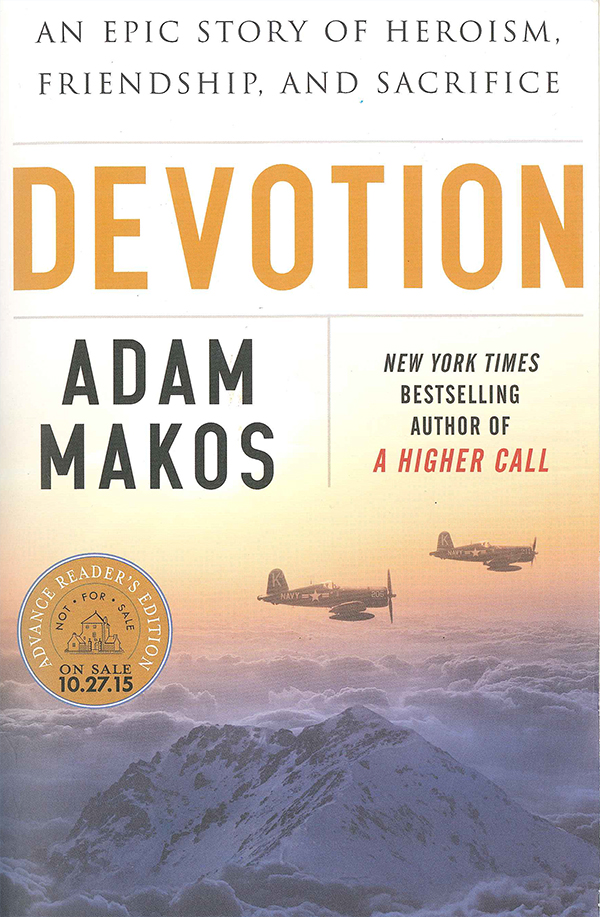
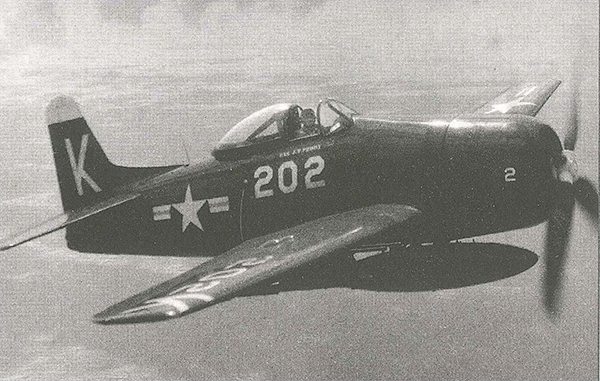
An F8F Bearcat piloted by Jesse Brown in November 1949.
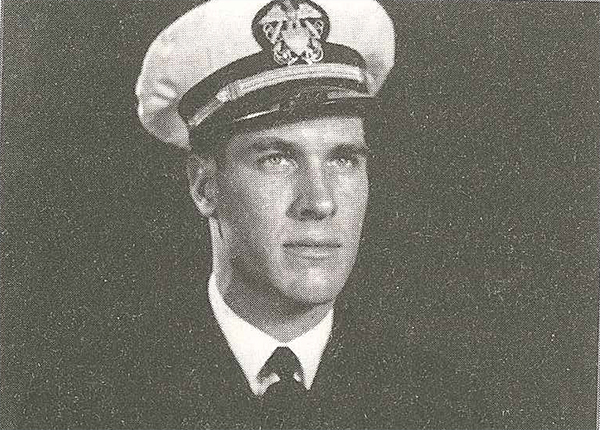
Tom Hudner, a naval officer.
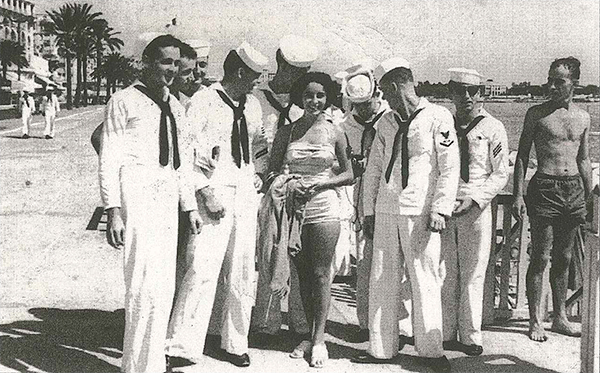
Elizabeth Taylor with sailors.
Model Aviation had the opportunity to talk with Adam Makos about his book, Devotion. The book is described as an epic story of heroism, friendship, and sacrifice. Here is our conversation with Adam.
MA: In the beginning of Devotion, you mentioned that World War II was your area of expertise and you felt unprepared to interview Captain Tom Hudner, but you asked for the opportunity anyway. What aspect of the interview made you want to tell his story and the story of Jesse Brown? Adam: Tom Hudner’s reputation preceded him. His name is legendary in military circles, for what he did to try to save his wingman, Jesse Brown—an intentional crash landing, behind enemy lines. It was one of most inspiring acts in military history. It hadn’t happened before, it hasn’t happened since. It was so super-human that the captain of his aircraft carrier went on the record saying, “There has been no finer act of unselfish heroism in military history.” I just had to figure out how Tom became the kind of person who would take such a risk, and “why”? What was it about Jesse Brown that Tom would put his life on the line for him?
MA: In the introduction to Devotion, you wrote that it was a war story, a love story, and an inspirational story—essentially an American story. How did you go about weaving the stories of all of those people whom you interviewed into this chronological story of Tom Hudner and Jesse Brown, who formed such an unlikely, enduring friendship that one risked his life to try to save the other against all odds? Adam: For so many of us, the Korean War is an enigma. We think of M.A.S.H., or Marilyn Monroe singing for the troops. There hasn’t been a good Korean War movie since Pork Chop Hill and even that dates back to 1959. So I tried to tell a bigger story, to pay homage to every veteran who fought that war, so he can hand this book to his grandkid and say, “See, this is what we fought for.” In addition to following the aviators as they fly guns blazing into human waves of enemy troops, we follow the Marines on the ground, the men who were looking up as the flyboys strafed overhead, raining down sizzling shell cartridges. We put the reader into the Marines’ frozen foxholes at the Chosin Reservoir as they fight in temperatures so cold that their weapons freeze solid. And ultimately, we come home with the men, to show the cost of war—a young wife getting that dreaded telegram and how she finds the courage to go on. Weaving these stories together was like conducting an orchestra, trying to get twenty pieces to sound in unison. But it wasn’t so tough. These young Americans all shared a common spirit, the spirit of their great generation. When it comes to Korea, we often forget: the “Greatest Generation” didn’t fight just one war.
MA: As part of your research into the background of this story, you were allowed into North Korea and mentioned that you owe the success of that venture to Captain Hudner. Can you go into more detail? Adam: Without spoiling the story, in December 1950, on a frozen mountainside in North Korea, Tom Hudner made a last promise to his dying friend—to one day come back for him. When I was writing the chapter in which he uttered those words, I stopped and called Tom. “Did you ever make it back to North Korea?” He had not; few, if any, Americans ever venture there. But then I thought of a B-17 pilot named Charlie Brown. A hero of my first book, “A Higher Call,” Charlie had this crazy notion that he could find the German pilot who had spared his life, forty years after their encounter. Charlie didn’t know the German’s name, they had only flown together for ten minutes. All he knew was the man’s face. Yet, Charlie searched the world and found his savior, Franz Stigler, when everyone else said it was impossible. So, I asked Tom Hudner: “Would you go back to North Korea if we can get you there?” His answer was a resounding “Yes.” And so in 2013, at age 89, Tom Hudner returned to North Korea to keep his promise made sixty-three years prior.
MA: You used quotes to tell much of this amazing story. Was this your intent, or was it because so many of those you interviewed had such strong, unclouded memories of what took place nearly 60 years before? Adam: What a difference a few years makes. Most World War II veterans are now in their 90s, and their storytelling ability is slipping. But these Korean Veterans—and their memories—are a few years younger. I also believe their stories had been pent-up inside of them for decades since the war. They didn’t have local school kids coming to write papers on them. They weren’t speaking at this Veteran’s Day ceremony or that. They, like their war, had been largely forgotten. So I like to think that this book was simply a key to open the flood gates for them, so they could finally have their say. And what stories they told. When you discover Tom, Jesse, and the heroes of Devotion, you’ll realize that they were just as brave as the WWII veterans, their battles were just as harrowing, their war mattered just as much, and they’re just as worthy of our respect. I hope “Devotion” gives a face to men and women of the Korean War. They deserve more than M.A.S.H.








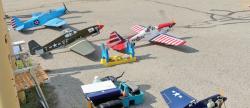

Add new comment